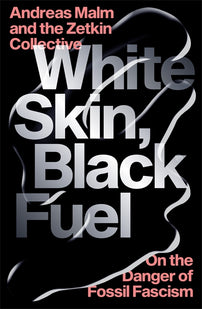White Skin, Black Fuel: a Letter from the Editor
Malm and the Zetkin Collective's latest contribution reveals the racist roots of ecofascism.

White Skin, Black Fuel: On the Danger of Fossil Fascism by Andreas Malm and The Zetkin Collective is included in our Verso Book Club in May. Join now for 50% off!
Swedish writer Andreas Malm is an editor’s dream author. Not only is he politically passionate (embers of the Trotskyist rabble-rouser and antifascist still glow), personally modest and blessed with an excellent, somewhat serrated, sense of humour, but he is also an intellectual powerhouse: not content with delivering a pathbreaking book on the origins of fossil capital (to be followed, we hope, by at least a second volume at some point, as well as a major book on a Marxist theory of wilderness), a co-authored book on Iran on the Brink: Rising Workers and Threats of War, in the last two years he has also produced a bracing polemic against constructivism, Latourism et tutti quanti, a pamphlet against the cloying consensus of non-violence in the ecology movement and a masterful short intervention on the Coronacatastrophe and the means to fight it . (Indeed, my only criticism of Comrade Malm is that he is a vegetarian, with all that that implies…)
And now, Andreas is publishing a 576pp book on the far right, ecology and climate change, White Skin, Black Fuel: On the Danger of Fossil Fascism. Well, actually, this is not a book by “Andreas Malm”, but, rather, by the Zetkin Collective, a multilingual group of younger scholars and graduate students brought together by Andreas, based at the University of Lund. Verso forced Andreas to separate his name out from the Collective so that the book would have more of a chance commercially, but the geographical range of the book indicates that this is a genuinely collectively composed work.
This detailed and definitive work grapples with the complex relationship the far right has cultivated with ecology – on the one hand, reifying “nature” for biologistic and essentialist reasons, hoping to reconstruct the racial and social order on the basis of a perceived hierarchy inherent within it, on the other, revelling and luxuriating in the destructive powers of steel, fire and concrete, with all that this implies today in terms of denialism as regards climate change. Thus the odes to forests and wolf packs, to the protection of environment and race against the pollution carried by “foreign elements” and “parasites”, to eugenics. But thus also the cult of the Panzer and the death camp and the libidinal investment in fossil fuels à la Trump and Bolsanaro, up to and including a pornographic fascination with the fumes they produce (yes, you read that correctly…)!
Of course, as the book recounts, the more canny neofascists – one thinks of Alain de Benoist or Marine Le Pen’s “Mr Environment”, Hervé Juvin – have tried to wrap up the programme of racism and violence in the leaves of localism, autarchy, anti-globalism, protection of the heritage, population control and “bioregionalism”. In this, they have been able to draw on older strands of völkisch, neopagan, and other reactionary ideological tropes that hark back to mythical preindustrial age. Some, especially in the light of the texts by El Paso and Christchurch terrorists, have warned about the dawn of a new ecofascist paradigm. But, as the Zetkin Collective underlines, by far the more powerful factor for the far right has been the attraction for fossil fuelled technology, which in many cases has its own racist roots. Today’s far right may, in certain circumstances, be willing to propose authoritarian and xenophobic measures as a response to ecological crises, but there is no sign of any fundamental break with the business as usual of fossil capital – black fuels to support white supremacy.
This is a thoughtful, fascinating and sometimes chilling study that brings home (thus the reference to Communist leader and writer Clara Zetkin) the urgency of building an anticapitalist movement that addresses climate change, a movement that also understands the centrality of antiracism and antifascism to its task.
–Sebastian Budgen, Senior Editor
